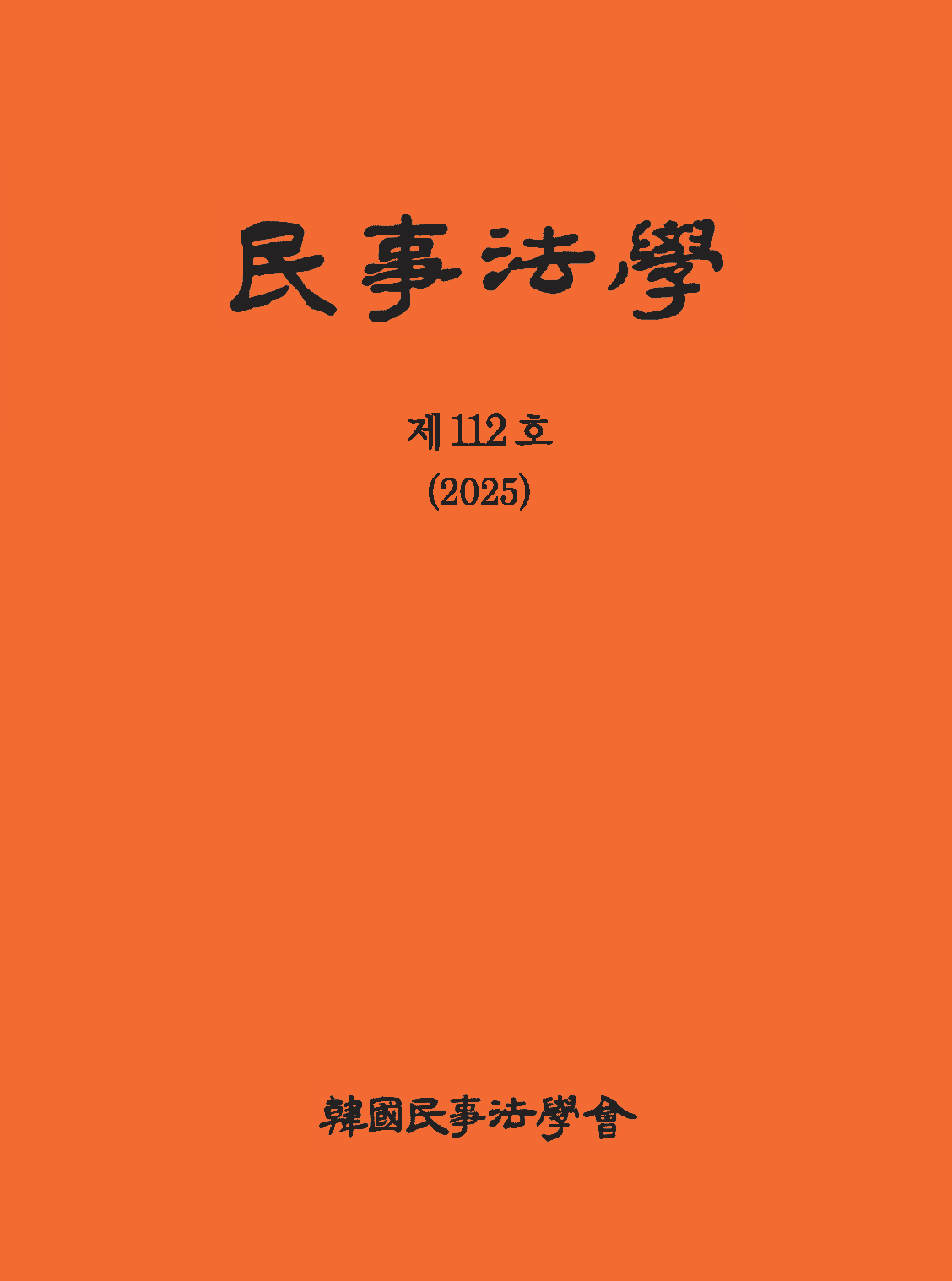학술논문
계속적 계약에서 무효, 취소의 소급효 제한 - 소급효 원칙의 관철, 손해배상책임의 한계 -
이용수 27
- 영문명
- The Restriction on the Retroactive Effect of Nullity or Revocation in Long-term Contracts - Observance of the Principle of Retroactivity, Limitations on Liability for Damages -
- 발행기관
- 한국민사법학회
- 저자명
- 이무룡
- 간행물 정보
- 『민사법학』제112호, 85~140쪽, 전체 56쪽
- 주제분류
- 사회과학 > 사회과학일반
- 파일형태
- 발행일자
- 2025.09.30
9,520원
구매일시로부터 72시간 이내에 다운로드 가능합니다.
이 학술논문 정보는 (주)교보문고와 각 발행기관 사이에 저작물 이용 계약이 체결된 것으로, 교보문고를 통해 제공되고 있습니다.

국문 초록
계약에 무효, 취소 사유가 있으면 효력이 소급적으로 소멸하는 것이 원칙이다. 그러나 이미 실행된 계속적 계약에서는 원상회복의 어려움, 거래안전 보호 등을 이유로 소급효의 제한이 논의된다. 주로 근로계약과 조합계약에서 문제되나, 계속적 계약 전반에 적용되는 일반 이론도 검토된다. 논의가 구체적으로 이루어진 독일과 오스트리아에서는 근로, 조합계약에서 무효, 취소의 소급효를 제한하는 것이 일반적이지만, 이들 계약에서도 강행규정, 공서양속 위반이나 사기, 강박 취소의 경우에는 소급효를 인정하는 견해가 유력하며, 임대차 등 그 밖의 계속적 계약에서는 소급효 긍정설이 대체로 인정된다. 소급효 제한 법리의 확대는 전반적으로 경계되는 모습이다. 우리나라와 일본은 지금까지 상대적으로 논의가 충실하지 못하였으나, 우리는 최근 선고된 가맹점계약 관련 하급심 판결이, 일본은 조합계약에 관한 민법 개정이 향후의 전개에 좋은 계기가 될 것으로 기대된다. 무효, 취소 규범의 목적을 진정으로 실현하기 위해서는 계속적 계약에서도 소급효가 관철되어야 한다. 소급효를 인정하더라도 거래안전은 현행 규정을 통해 보호될 수 있고, 보호 범위를 적정하게 설정하기 위해 그러한 해결이 요청되기도 한다. 소급효를 인정하여 원상회복을 인정할 ‘필요성’은 큰 반면, 소급효 제한의 주된 근거인 원상회복의 ‘어려움’은 단일 급부계약과 계속적 계약을 구분짓는 유의미한 기준이 될 수 없고 정당성이나 실효성도 떨어진다. 개념의 의의를 완전히 부정할 수는 없더라도 보충적인 최후수단으로만 자리매김하여야한다.
소급효를 제한하면서 무효, 취소 사유로 인한 계약 당사자의 불이익을 손해배상책임(불법행위책임)을 통해 해결하는 방안도 상정해볼 수 있다. 그러나 우선 책임 성립을 장담할 수 없고, 책임 성립 자체는 인정되더라도 손해 산정 단계에서 원상회복의 어려움을 야기하는 정당한 급부 가치의 산정 문제가 재발하는 등 한계가 있다. 재판실무에서는 소급효와 그에 따른 원상회복을 전제로 충실한 심리를 한 끝에 결과적으로 원상회복의 어려움이 확인되었을 때 비로소 소급효 제한이 선언될 수 있을 뿐이다. 계약 유형에 따라 미리 소급효 제한을 인정하는 것은 결론의 부당한 선취(先取)이다.
영문 초록
In principle, a contract is retroactively invalid if it has grounds for nullity or revocation. However, for long-term contracts that have already been executed, the restriction on retroactive effect is often considered due to the difficulty of restitution and the safety of transactions. While this issue primarily arises in employment/partnership contracts, a general theory applicable to all kinds of long-term contract could be also considered. In Germany and Austria, where these discussions have been detailed, it's common to restrict the retroactive effect in aforementioned contract types. However, even there, the prevailing view holds that retroactive effect is accepted in cases involving violations of mandatory provisions, public order and fraud or duress. For other long-term contracts, such as lease, the prevailing view is to stick to the retroactive effect. Expanding the theory of restricting retroactive effect is considered cautiously in general. In Korea and Japan, discussions on this topic have been relatively less substantial until now. However, in Korea, a recent high court decision on a franchise contract is expected to be a good catalyst for coming discussions. And in Japan, the revision of its Civil Code regarding partnership contract is anticipated to serve a similar role.
To truly satisfy the purpose of nullity and revocation regulations, the retroactive effect should be maintained even in long-term contracts. Security of transactions could still be protected through existing provisions, and this approach is sometimes necessary to adjust an appropriate scope of protection. While there is a great ‘necessity’ to recognize retroactive effect and restitution, the 'difficulty' of restitution - the main ground for restricting retroactive effect – cannot be a meaningful criterion for distinguished regulations between single-performance and long-term contracts. Its legitimacy and effectiveness are also questionable. Although that concept itself cannot be entirely denied, it should only serve as a supplementary last resort.
One could also consider restricting retroactive effect and instead addressing the disadvantages to a contract party caused by nullity or revocation through compensation for damages(tort liability). However, there is clear limitations to this approach. First, the establishment of liability is not guaranteed. And even if that liability is established, the problem of assessing the correct value of performance, which causes the difficulty of restitution, recurs in terms of estimating damages.
In litigation practice, based on the assumption of retroactive effect, the limitation on retroactive effect should only be declared at the end of the trial when the difficulty of restitution is confirmed. Prematurely restricting the retroactive effect depending on the type of contract is just a hasty conclusion.
목차
Ⅰ. 서론
Ⅱ. 무효, 취소 소급효 제한 법리의 검토
Ⅲ. 소급효 제한 시 손해배상책임의 구성과 기능 상 한계
Ⅳ. 결론
키워드
해당간행물 수록 논문
- 채권자대위권과 대위하는 권리[피대위권리] - 형성권에 관하여 -
- 재단법인의 공익성에 관한 소고
- 계속적 계약에서 무효, 취소의 소급효 제한 - 소급효 원칙의 관철, 손해배상책임의 한계 -
- 경제적 지위의 남용에 따른 반사회질서 행위
- 신축 건물소유권 귀속에 관한 입법론적 고찰
- 기간의 정함이 있는 주택임대차와 임차인의 중도해지권 - 일본 차지차가법(借地借家法) 제38조를 중심으로 -
- 코로나19와 상가임대차 - 대법원 2025. 5. 1. 선고 2024다293580 판결을 중심으로 -
- 권리금에 관한 관습
- 하도급거래에 있어 계약자유와 계약통제
- 본안판결을 받을 이익
- 민법에서 사적 자치의 의의 ― ‘거래의 안전’ 요청과의 비교를 중심으로 한 개인적 접근 ―
참고문헌
관련논문
사회과학 > 사회과학일반분야 BEST
- AI와 디지털 문화 산업의 결합에서 저작권 및 윤리적 규범 준수의 필요성 연구
- 인공지능(AI)과 윤리
- 종합병원 간호사의 환자안전문화인식과 조직의사소통만족이 안전간호활동에 미치는 영향
사회과학 > 사회과학일반분야 NEW
더보기최근 이용한 논문
교보eBook 첫 방문을 환영 합니다!

신규가입 혜택 지급이 완료 되었습니다.
바로 사용 가능한 교보e캐시 1,000원 (유효기간 7일)
지금 바로 교보eBook의 다양한 콘텐츠를 이용해 보세요!



